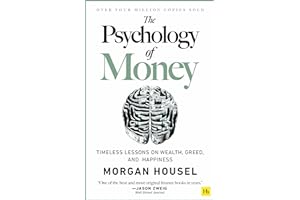One sentence summary
This book offers timeless lessons on wealth, greed, and happiness, exploring the psychology behind money and how we can use it to improve our lives.
Book genre
Self-help/Personal Finance
Main topic of the book
The psychology behind money and how it impacts our lives, decisions, and relationships.
Key ideas
- Money is a powerful tool that can bring both positive and negative impacts to our lives.
- Our attitudes and behaviors towards money greatly influence our financial success and happiness.
- Understanding the past and present trends of money and wealth can help us make better financial decisions in the future.
- Everyone has their own unique relationship with money based on their upbringing, experiences, and beliefs.
- Investing is not just about numbers and returns, but also about our emotions and behavior patterns.
Main parts of the book and a short summary
- Part 1: Psychology and Money – This section explores the psychological aspects of money, such as our biases, emotions, and behaviors, and how they impact our financial decisions.
- Part 2: Saving and Spending – In this section, the author delves into the importance of saving and spending habits and how they can lead to financial success or downfall.
- Part 3: Time and Compounding – This section discusses the power of time and compound interest in building wealth, and how delayed gratification can lead to greater financial rewards.
- Part 4: Risk and Uncertainty – Here, the author discusses the role of risk and uncertainty in investing, and how understanding our own risk tolerance can help us make better investment decisions.
- Part 5: Psychology and Happiness – Finally, this section explores the connection between money and happiness, debunking common misconceptions and offering insights on how money can positively impact our well-being.
Key takeaways
- Understanding our attitudes and behaviors towards money is crucial in achieving financial success and happiness.
- Being aware of our biases and emotions can help us make better financial decisions.
- Saving and spending wisely, while also understanding the power of compound interest, is key in building long-term wealth.
- Investing is not about timing the market, but rather understanding our own risk tolerance and sticking to a solid investment plan.
- Money can bring happiness, but only to a certain extent. Prioritizing relationships, experiences, and purpose in life is more important for long-term happiness.
Author’s background and qualifications
Morgan Housel is a partner at The Collaborative Fund and a former columnist and Wall Street Journal and Motley Fool. He has also written for The New York Times and USA Today. With over a decade of experience in the financial services industry, Housel offers valuable insights and perspectives on the psychology of money based on his research and personal experiences.
Target audience
This book is suitable for anyone interested in personal finance and understanding the psychology behind money. It is also useful for those looking to improve their financial habits and decision-making skills.
Publisher and first publication date
The Psychology of Money was published by Harriman House in September 2020.

